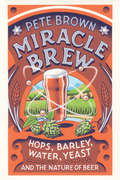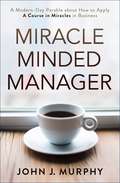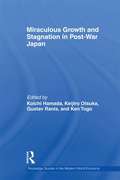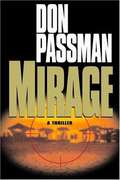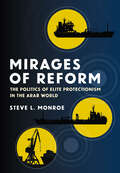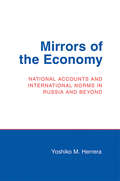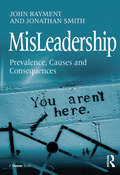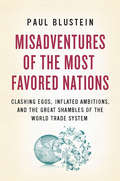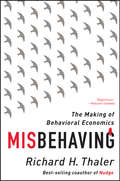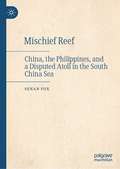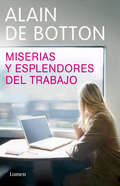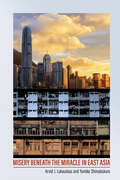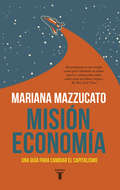- Table View
- List View
Miracle Brew: Hops, Barley, Water, Yeast and the Nature of Beer
by Pete BrownMost people know that wine is created by fermenting pressed grape juice and cider by pressing apples. But although it’s the most popular alcoholic drink on the planet, few people know what beer is made of. In lively and witty fashion, Miracle Brew dives into traditional beer’s four natural ingredients: malted barley, hops, yeast, and water, each of which has an incredible story to tell. From the Lambic breweries of Belgium, where beer is fermented with wild yeasts drawn down from the air around the brewery, to the aquifers below Burton-on-Trent, where the brewing water is rumored to contain life-giving qualities, Miracle Brew tells the full story behind the amazing role each of these fantastic four—a grass, a weed, a fungus, and water—has to play. Celebrated U.K. beer writer Pete Brown travels from the surreal madness of drink-sodden hop-blessings in the Czech Republic to Bamberg in the heart of Bavaria, where malt smoked over an open flame creates beer that tastes like liquid bacon. He explores the origins of fermentation, the lost age of hallucinogenic gruit beers, and the evolution of modern hop varieties that now challenge wine grapes in the extent to which they are discussed and revered. Along the way, readers will meet and drink with a cast of characters who reveal the magic of beer and celebrate the joy of drinking it. And almost without noticing we’ll learn the naked truth about the world’s greatest beverage.
Miracle Life, Inc.
by Lauren H. Cohen Christopher MalloyMiracle Life is a firm with a unique setup and organizational structure. Specifically, it is a network marketing firm (also known as multi-level marketing (MLM) firm), which utilizes a large distributor base, and depends on this individual distributor base to sell its products, giving explicit incentives for these individual distributors to both sell its products and sign up other distributors. The case gives students the opportunity to take the basic framework of Discounted Cash Flow (DCF) Analysis, and apply it to two unique perspectives of an identical problem. The students will then use this DCF approach to rationalize observed stock prices, connecting the two, and further reconciling how a company's future plan for growth, and the plausibility of this plan, has implications jointly for DCF and stock prices.
Miracle Medicines
by Robert L. ShookIt’s the business of saving lives. Miracle Medicines goes behind the scenes of the pharmaceutical industry and into the high-security laboratories to tell the stories of the men and women---chemists, physiologists, medical and clinical researchers, engineers---who have chosen to toil for years in the lab in order to transform scientific theories into new lifesaving medicines. You’ll witness the day-to-day labors, victories and defeats of the dedicated professionals who are waging a war against the diseases that still plague mankind. From the confines of their laboratories, these pharmaceutical adventurers explore unknown territories in health and science. Miracle Medicines reveals what really happens during the long and uncertain journey that each new drug and its creators must endure from theory, to research, to testing and, finally, FDA approval and delivery to the public. It’s a very human story within the context of fascinating scientific innovation. Through first hand interviews you’ll also meet the patients who benefit from these manmade miracles and learn how, within their bloodstreams, an ongoing battle is raging. The drugs profiled are: Advair: GlaxoSmithKline’s revolutionary asthma medication, the first packaged as both a control and emergency drug. Gleevec: The Novartis’ chronic myeloid leukemia treatment born from decades of medical research in a field of study that was once considered hopeless. Humalog: Eli Lilly’s reinvention of insulin to control diabetes has been described as being better than nature Lipitor: Pfizer’s miracle antidote for high cholesterol that was nearly lost to the pharmaceutical vaults and has since become the world’s top-selling medicine. Norvir: Abbott’s contribution to the fight against HIV that nearly erases all traces of the disease from the bloodstream and prolongs the life of patients. Remicade: Created for the treatment of Crohn’s disease, rheumatoid arthritis and other Immune Mediated Inflammatory Diseases, Johnson & Johnson’s revolutionary biomedicine was developed from technology that once was only found in science fiction. Seroquel: AstraZeneca’s treatment for both schizophrenia and bipolar mania that has given millions of psychiatrics a new lease on life. This compelling and truth-revealing book will forever change the way you view the medicines in your medicine cabinet, and the people who create them. .
Miracle Medicines
by Robert L. ShookIt's the business of saving lives. Miracle Medicines goes behind the scenes of the pharmaceutical industry and into the high-security laboratories to tell the stories of the men and women---chemists, physiologists, medical and clinical researchers, engineers---who have chosen to toil for years in the lab in order to transform scientific theories into new lifesaving medicines. You'll witness the day-to-day labors, victories and defeats of the dedicated professionals who are waging a war against the diseases that still plague mankind. From the confines of their laboratories, these pharmaceutical adventurers explore unknown territories in health and science. Miracle Medicines reveals what really happens during the long and uncertain journey that each new drug and its creators must endure from theory, to research, to testing and, finally, FDA approval and delivery to the public. It's a very human story within the context of fascinating scientific innovation. Through first hand interviews you'll also meet the patients who benefit from these manmade miracles and learn how, within their bloodstreams, an ongoing battle is raging. The drugs profiled are: Advair: GlaxoSmithKline's revolutionary asthma medication, the first packaged as both a control and emergency drug. Gleevec: The Novartis' chronic myeloid leukemia treatment born from decades of medical research in a field of study that was once considered hopeless. Humalog: Eli Lilly's reinvention of insulin to control diabetes has been described as being better than nature Lipitor: Pfizer's miracle antidote for high cholesterol that was nearly lost to the pharmaceutical vaults and has since become the world's top-selling medicine. Norvir: Abbott's contribution to the fight against HIV that nearly erases all traces of the disease from the bloodstream and prolongs the life of patients. Remicade: Created for the treatment of Crohn's disease, rheumatoid arthritis and other Immune Mediated Inflammatory Diseases, Johnson & Johnson's revolutionary biomedicine was developed from technology that once was only found in science fiction. Seroquel: AstraZeneca's treatment for both schizophrenia and bipolar mania that has given millions of psychiatrics a new lease on life. This compelling and truth-revealing book will forever change the way you view the medicines in your medicine cabinet, and the people who create them.
Miracle Minded Manager: A Modern-Day Parable about How to Apply A Course in Miracles in Business
by John MurphyReaders witness fictional company president Jack MacDonald use the wisdom from A Course in Miracles to transform his company and relationships beyond anything he could ever imagine.Written in story form, Miracle Minded Manager approachably integrates the lessons author John J. Murphy has learned in both his personal and professional life since first learning about A Course in Miracles in 2008. Murphy credits the Course for accelerating his growth and prosperity and quadrupling his business revenues within two years, and now you, too, can benefit from the blending of lessons from A Course in Miracles and Murphy&’s modern-day training. Jack MacDonald, president of TYPCO, is trying to transform his company. He&’s hit a roadblock with unhelpful and defensive direct reports and ingrained systems of doing business that no longer serve. Unsure of how to continue, he turns to business consultant Jordan Mckay, who has helped Jack with management challenges in the past. Jack is surprised that instead of suggesting practical business tactics, Jordan encourages him to adopt A Course in Miracles to open his mind and let go of ego. Though at first, he&’s reluctant, Jack and his wife, Judy, begin to follow the Course. The results are life changing.
Miracle for Whom?: Chilean Workers Under Free Trade (New Political Economy Ser.)
by Janine BergMiracle for Whom? offers a fresh and insightful perspective to the debate on rising income inequality in Chile, and on the broader question of how free trade affects the demand for workers in developing countries.
Miraculous Growth and Stagnation in Post-War Japan (Routledge Studies in the Modern World Economy)
by Gustav Ranis Keijiro Otsuka Koichi Hamada Ken TogoThis volume examines different aspects of the Japanese experience in a comparative context. There is much here of relevance to contemporary developing countries anxious to initiate the experience of miraculous growth and anxious to avoid the subsequent stagnation. Such issues of the role of government in providing the right amount of infant industry protection, the relevance of the financial system, the country’s peculiar corporate structure and the role of education in a comparative context serve to illuminate the lessons and legacies of this unique experience in development. The relationship between various dimensions of its domestic policy experience and Japan’s international experience in trade promotion and foreign aid is explored and is of special interest to an international audience of academics and policymakers.
Mirae Asset: Korea's Mutual Fund Pioneer
by Michael Shih-ta Chen G. A. Donovan Mukti KhairePark Hyeon-Joo, the founder and Chairman of Korea's earliest and largest mutual fund company, plans to expand internationally. After first offering emerging market funds to his Korean customers, the company then began selling local-currency funds in India and Brazil. Now he has to decide his next steps. Should he build on his emerging market expertise and focus his business expansion in developing countries? If so, where should he concentrate his efforts -- India, Brazil, China, or other countries? Or should he instead focus on expanding into developed markets through operations in New York and London?
Mirage
by Don PassmanA mental whiz who runs a cyber-encryption company, John Berger is at the top of his game and sure that all his hard work will soon pay off. After playing in a two-day chess tournament, he arrives at work to find his office building bombed and several people killed. When questioned by the police, he explains he was playing chess at the time of the explosion. Then comes a greater shock ("the police tell him the chess tournament never took place.
Mirages of Reform: The Politics of Elite Protectionism in the Arab World
by Steve L. MonroeIn Mirages of Reform, Steve L. Monroe argues that geopolitics and social connections between state and capital underpin the Arab world's uneven trade policies. Despite decades of international pressure, neoliberal trade policy reform in the Arab world has been varied, selective, and often ineffective. Neoliberal trade policies have not deepened international trade in many of the region's markets. This book explains why.When the region's regimes have strong support from global powers and strong social connections to the industrial elite, they engage in extensive but deceptive trade policy reform. Behind an edifice of neoliberal trade policies, neopatrimonial forms of protectionism like tax evasion and noncompetitive procurement shield the socially connected from international competition and obstruct actual trade liberalization. Industrialists are less trustful of regime promises of neopatrimonial protectionism after reform when they have weak social connections to their regime and their regime has low support from global powers. They are more likely to defend existing protectionist policies under these conditions, resulting in less trade policy reform. Drawing on interviews, firm- and industry-level data, and evidence from Jordan to Morocco, Mirages of Reform reveals how international and domestic factors interact to shape the Arab world's rugged trade policy terrain. Insightful and well researched, this book imparts important lessons and warnings about the repercussions of economic reform in the region.
Miranda's Waning Protections: Police Interrogation Practices after Dickenson
by Welsh S. WhiteDid the Supreme Court's upholding of Miranda in 2000 adversely impact law enforcement, as conservatives have complained, or was it a reaffirmation of individual rights? Welsh S. White looks at both sides of the issue, emphasizing that Miranda represents just one stage in the Court's ongoing struggle to accommodate a fundamental conflict between law enforcement and civil liberties, and assessing whether the Court's present decisions (including Miranda) strike an appropriate balance between promoting law enforcement's interest in obtaining reliable evidence and the individual's interest in being protected from overreaching police practices.
Mirassou Vineyards (A)
by D. Daryl WyckoffExamines the decision by Mirassou to test a mechanical grape harvester that requires a major change in growing methods and operations. The machine is unproven and the investor has asked this vineyard to test it for him and commit to use it.
Mireles, el rebelde
by J. Jesús LemusMireles, el rebelde es un ensayo periodístico inédito donde Jesús Lemus, autor de Los malditos, construye un perfil del fundador de las autodefensas en México: José Manuel Mireles. En esta obra el autor desarrolla de forma analítica e informada su visión sobre José Manuel Mireles, fundador de las autodefensas en las zona de Michoacán y Guerrero, que sin duda nos ayudará a entender mejor el grave conflicto que se vive en esa zona de México y enriquecerá la discusión acerca de la seguridad nacional y la lucha contra el narcotráfico.En estas páginas el autor describe el momento y las circunstancias que orillaron a los habitantes de las zonas de Guerrero y Michoacán a levantarse en armas liderados por la iniciativa del Doctor Mireles. Sin caer en apologías adulatorias, el autor cuenta paso a paso el desarrollo de un malestar social generalizado que se convirtió en iniciativa de cambio social. El conflicto de las autodefensas en Michoacán es un tema de gran importancia en el ámbito nacional e internacional con repercute en temas como la violencia, la seguridad y el narcotráfico, y es por ese motivo que este ensayo encuentra una importancia fundamental para entender esta situación.
Mirror Mirror: Creating the Need for Change-Starting the Journey to Transformative Growth Through the Empowerment of Frontline Employees
by Vineet NayarWhen it comes to transforming your business for profitable growth, where do you begin? For CEO Vineet Nayar, who took the reins of IT services giant HCL Technologies in 2005, it began with an honest look in the corporate mirror. Although HCLT had surpassed $700 million in annual revenue and had a good track record of growth, it had begun to lose market share and, worse, mindshare-some of the company's most talented employees were leaving to work for competitors. In this chapter, Nayar describes what he calls the "Mirror Mirror" approach that set HCLT on the road to change. By communicating openly with employees and challenging them to acknowledge the reality of their company's trailing position, Nayar was able to clarify that the "value zone" of the company lay not in its array of technologies, but in the work of his frontline employees who, in their daily interactions, created customer value. In a bold move, he turned the corporate hierarchical pyramid upside down, making management accountable to those in the value zone instead of the other way around. The result was a complete transformation-and one that turned out to be both profitable and sustainable. This chapter was originally published as Chapter 1 of "Employees First, Customers Second: Turning Conventional Management Upside Down."
Mirrors of the Economy: National Accounts and International Norms in Russia and Beyond (Cornell Studies in Political Economy)
by Yoshiko M. HerreraAs international institutions multiply and more governments sign on to standardized ways of organizing economies and societies, resistance to globalization persists. In Mirrors of the Economy, Yoshiko M. Herrera explores the variance in implementation of international institutions through an examination of the international System of National Accounts (SNA) and, in particular, the success of post-Soviet Russia and other formerly communist countries in implementing the SNA. The SNA is the basis for all national economic indicators, including Gross Domestic Product, and is therefore a critical institution for economic policy and development. Herrera tests existing theories of implementation of international institutions and proposes a novel theoretical concept, "conditional norms," to suggest that the conditions attached to norms may result in institutional change. On the basis of content analysis of statistical publications and more than seventy-five interviews throughout Russia—particularly in Moscow—and in Washington, she forms a clear picture of the implementation of the SNA in Russia in the early 1990s. In Soviet times a stable conditional norm delineated the appropriateness of statistical institutions based on the structure of the economy. The transformation of the economic system triggered a shift in support among Russian and Eastern European statisticians in favor of the SNA. Herrera's argument increases our understanding of the role of norms, structural conditions, and professional communities in institutional implementation.
Mis finanzas personales
by Camilo Pinto Andrade Jorge Arenas Dulcey María José Samper GomezUna guía para aprender a manejar las finanzas. ¿ Por que muchas personas no prosperan financieramente?Es común ver quemuchas personas no logran avanzar financieramente, ni consolidar unpatrimonio, y mucho menos construir una vida de seguridad financiera.Independientemente de todas las dificultades de tipo social y económicoque resaltan en nuestros países latinoamericanos, es evidente el totalanalfabetismo que existe en relación con las finanzas personales y laadministración del dinero.Millones de personas gastan más de lo que seganan, viven con deudas exageradas, no saben en qué se gastan una partede sus ingresos, ven el ahorro y la inversión sólo como una posibilidadaccidental, y las palabras ?planificación financiera en finanzaspersonales? poco o nada tienen que ver con su vida cotidiana.El objetivode este libro es, con un lenguaje sencillo, poner a disposición de todotipo de personas los principios fundamentales y prácticos para construiruna vida de seguridad y tranquilidad financiera.Esta es la guía definanzas personales para los no financieros.¡Decida tomar control de sufuturo financiero HOY!
MisLeadership: Prevalence, Causes and Consequences
by Jonathan Smith John RaymentThe 'MisLeadership' of this book's title is a description of the phenomenon the authors have uncovered through their analysis of the validity, or otherwise, of current leadership styles and achievements, in the light of the challenges leaders face, and particularly of the urgent global issues with which business leaders are now confronted. John Rayment and Jonathan Smith examine existing approaches to leadership with a focus on their shortcomings, categorized according to the four main types of misLeadership the authors have identified - Missing, Misguided, Misinformed and Machiavellian leadership. Each of these forms of misleadership has a corollary in one of the four elements of the kind of holistic leadership that the authors advocate - the capacity for effective decision making, the adoption of a global perspective, the move to a new business paradigm to replace the current economic and social one, and commitment to a contemporary mission. From Rayment and Smith's passionately argued, but well reasoned perspective, leaders, the led and those responsible for leadership development will gain an insight into the prevalence and causes of misleadership and into ways in which it can be identified and overcome. A range of examples and case studies is provided to enable the concepts presented here to be related to practice. As well as illustrating instances of 'misleadership' these also demonstrate that the emphasis in relation to the decision making models currently available to leaders may not be the most important stages of the processes involved. The global perspective emphasized by the authors is not just about globality in the geographical sense. An important part of the way forward suggested here involves considering all aspects of humanity - the physical, mental and spiritual strength, stamina and fitness of individuals, groups and societies, in the context of a 'Global Fitness Framework'. All this is presented in a practical and approachable style that enables these authors to introduce a new approach to a key element of management thinking, in a way that will encourage and empower individuals to think on a different scale, challenge assumptions and exercise effective leadership.
Misadventures of the Most Favored Nations: Clashing Egos, Inflated Ambitions, and the Great Shambles of the World Trade System
by Paul BlusteinAn acclaimed expert on the global economy illuminates the human foibles, hidden agendas, and political follies that threaten the end of the globalization movement
Misbehaving: The Making of Behavioral Economics
by Richard H. ThalerGet ready to change the way you think about economics. Richard H. Thaler has spent his career studying the radical notion that the central agents in the economy are humans--predictable, error-prone individuals. Misbehaving is his arresting, frequently hilarious account of the struggle to bring an academic discipline back down to earth--and change the way we think about economics, ourselves, and our world. Traditional economics assumes rational actors. Early in his research, Thaler realized these Spock-like automatons were nothing like real people. Whether buying a clock radio, selling basketball tickets, or applying for a mortgage, we all succumb to biases and make decisions that deviate from the standards of rationality assumed by economists. In other words, we misbehave. More importantly, our misbehavior has serious consequences. Dismissed at first by economists as an amusing sideshow, the study of human miscalculations and their effects on markets now drives efforts to make better decisions in our lives, our businesses, and our governments. Coupling recent discoveries in human psychology with a practical understanding of incentives and market behavior, Thaler enlightens readers about how to make smarter decisions in an increasingly mystifying world. He reveals how behavioral economic analysis opens up new ways to look at everything from household finance to assigning faculty offices in a new building, to TV game shows, the NFL draft, and businesses like Uber. Laced with antic stories of Thaler's spirited battles with the bastions of traditional economic thinking, Misbehaving is a singular look into profound human foibles. When economics meets psychology, the implications for individuals, managers, and policy makers are both profound and entertaining.
Mischief Reef: China, the Philippines, and a Disputed Atoll in the South China Sea
by Senan FoxThis seven-chapter book examines the background to and consequences of the disputed occupation of Mischief Reef in the Spratly Islands group of the South China Sea (SCS) by the People’s Republic of China (PRC), from the mid-1990s to the present day. Although Mischief Reef has received significant media attention and has been discussed in academic journal articles and policy research reports, no books on the topic have appeared since a 30-page publication in 1996. By covering the topic in historical, domestic political, legal, economic, strategic, and geo-political terms, this book not only fills a gap on a particularly important issue with global consequences, but also acts as a follow-on to a previous Palgrave book by this author on another maritime dispute, Socotra Rock. This book will be of interest to journalists, scholars and legal theorists researching the implications of China's rise for maritime disputes in East Asia.
Miserias y esplendores del trabajo
by Alain de BottonUna reflexión irónica sobre el mundo del trabajo y del consumo El autor mismo define su libro como un himno a la inteligencia, peculiaridad, la belleza y el horror de los lugares de trabajo y al hecho extraordinario de que el trabajo sea, junto al amor, la principal fuente de sentido de nuestra vida. Hace poco más de un siglo, nuestros antepasados sabían todavía el origen preciso de lo que poseían y comían. Estaban familiarizados con los animales, las herramientas y tenían una relación cómplice con su entorno de trabajo. Ahora, todo nos llega envuelto en fundas cargadas de etiquetas y poco falta para que los niños crean que los pollos nacen en los supermercados. Dispuesto a romper esta barrera, Alain de Botton se aventura primero a darse un paseo por los muelles del puerto de Londres, para desplazarse luego a una fábrica de galletas en el interior del país, luego viaja a las Maldivas con los pescadores encargados de unafábrica de conservas para acabar en los despachos de una empresa que se dedica a la contabilidad. Lo que más le interesa es hablar con las personas que están cerca de los procesos productivos para ilustrar las peculiaridades del "homo faber", y las bondades de casi cualquier trabajo cuando lo examinamos de cerca. Tras estas conversaciones, nada es igual ya: la cereza que corona una galleta, la tapicería de un avión o una lata cualquiera de sardinas tienen a alguien con cara y ojos que estuvo al cargo de su proceso, y de repente el trabajo se vuelve algo menos abstracto y más cercano a los anhelos y las angustias del ser humano. Culto, irónico, maestro de la anécdota, Alain de Botton nos habla de Diderot y Voltaire mientras camina por los hangares de una gran fábrica y reflexiona sobre la naturaleza del arte mientras recorre las líneas de una central eléctrica. «Prepararse para la muerte con preceptos sabios es ofrecerle demasiado respeto. Dejemos que nos sorprenda mientras transportamos pasta de madera o buscamos la mejor manera de fabricar un frasco de perfume: hagamos que la muerte nos pille mientras hacemos algo para la vida.» Con estas palabras se cierra el libro y se abren un montón de puertas insólitas para el lector. La crítica ha dicho:«Si es que todavía hace falta hablar de las bondades de un escritor como Alain de Botton, pues les diré que en Miserias y esplendores del trabajo este hombre se supera a sí mismo en la perspicacia de sus reflexiones y en su complicidad con el ser humano.»Geoff Dyer «De Botton te lleva a pensar en cómo vives pero, sobre todo, en cómo podrías vivir.»The Times
Misery beneath the Miracle in East Asia (Studies of the Weatherhead East Asian Institute, Columbia University)
by Arvid J. Lukauskas Yumiko ShimabukuroMisery beneath the Miracle in East Asia challenges prevailing views of the East Asian economic miracle. Existing scholarship has overlooked the severity, persistence, and harmful consequences of the social-welfare crises affecting the region. Arvid J. Lukauskas and Yumiko Shimabukuro fill this gap and put a major asterisk on East Asia's economic record. Combining big-picture analysis, abundant data, a dynamic interdisciplinary framework, and powerful human stories, they shed light on the social ills that governments have failed to address adequately, including low wages, child abuse, elderly poverty, and substandard housing. One of the major forces behind the multidimensional welfare crises is the region's productivist welfare strategy, which prioritizes economic growth while abandoning a robust social safety net, leaving the most vulnerable segments of society largely unprotected. Misery beneath the Miracle in East Asia brings the region into debates over the dangers of seeking growth at all costs that are currently embroiling the United States and other advanced industrialized countries.
Misfit: autistic. gay. immigrant. changemaker.
by Andreas SouvaliotisUpdated and expanded: A new edition of the inspiring memoir by one of Canada's most unusual, successful and socially conscious businesspeople."I am different. I have always been different. I grew up scared of being found out, scared of my natural inability to fit in, to conform, to look and sound and dress and behave 'normal.' I was always drawn to the different ones and I observed them with fascination--but the thought of being even a little bit like them mortified me. I was desperate to fit in. . . ." --From MisfitAndreas Souvaliotis was raised at a time when being on the autism spectrum wasn't easily diagnosed or even discussed. Minds like his were simply considered odd. He also knew from an early age he was gay, and it terrified him as he was growing up with openly homophobic parents in one of Europe's least tolerant societies.Andreas's differences made him an outsider, right through to his mid-forties. And then suddenly, everything changed. Misfit is the extraordinary memoir of a man who realized there was strength in his strangeness, that it could be used as a force for good. "It all happened in a flash. On a beautiful spring morning in 2007, sitting in my backyard and licking my wounds from a spectacular career derailment, I came up with a big idea--and I found myself contemplating the most daring and unconventional pursuit of my life." The weird kid from Greece was on his way to making his world, and everyone's world, a better place.Andreas Souvaliotis's inspiring story shows us that everyone has what it takes to trigger positive change, and that none of us should see our differences and quirks as handicaps.
Misión economía: Una guía para cambiar el capitalismo
by Mariana Mazzucato¿Y si aplicáramos a nuestros problemas actuales el espíritu, la audacia y los medios que nos llevaron a la Luna? Una crítica contundente y muy necesaria del capitalismo moderno en la que la galardonada economista internacional sostiene que, para resolver las crisis a las que nos enfrentamos, debemos ser innovadores. Llegar a la Luna fue un extraordinario logro que requirió nuevas formas de colaboración entre los sectores público y privado, un altísimo nivel de compromiso y coordinación y la aceptación de riesgos y gastos muy elevados para alcanzar una meta a largo plazo. Inspirándose en las misiones del programa lunar, Mazzucato propone que se aplique ese mismo nivel de innovación a una serie de objetivos sociales, económicos y políticos clave con el fin de salir de nuestro estancamiento rumbo a un futuro más optimista. El capitalismo lleva tiempo paralizado y no ofrece respuestas a nuestros mayores problemas, como las epidemias, la desigualdad y la crisis ambiental. Se impone la necesidad de repensar el papel de los Estados en la economía y la sociedad, de orientar los presupuestos al largo plazo y de recuperar el sentido del interés público. Misión economía, cuyas ideas ya se están adoptando en todo el mundo, propone fijarse unos objetivos inspiradores e ilusionantes, entre los que se incluyen una prosperidad ampliamente compartida, unos servicios públicos de calidad para todos y una solución a la crisis climática. Según Mazzucato, los Estados pueden afrontar grandes desafíos y misiones ambiciosas, y su visión ofrece una salida a nuestro inmovilismo hacia un futuro más optimista. La crítica ha dicho...«Su propuesta es tan amplia como poco habitual: un nuevo relato convincente sobre cómo crear un futuro deseable.»The New York Times «Su defensa de un nuevo enfoque es abrumadora. Nos contagia con el tipo devisión, ambición e imaginación que tan desesperadamente necesitamos hoy.»The Guardian «Una visión oportuna y optimista. Aunque presenta sus argumentos de manera tan clara que pueden parecer obvios, lo cierto es que son revolucionarios.»Nature «Mazzucato sostiene que las sociedades deben abjurar de ideologías agotadas y adoptar el enfoque político que llevó a los astronautas en la Luna. Convincente y fascinante.»The Economist «Mazzucato critica la pobreza de la idea de que el único papel del gobierno es corregir las "fallas del mercado". Aboga por un sector público capaz de adaptarse a circunstancias cambiantes y nuevos desafíos.»Prospect «Mazzucato propone rediseñar el capitalismo a favor de las partes interesadas más que de los accionistas.»The Times «Desde 1969 nos preguntamos cómo los humanos pudieron llegar a la Luna y no logran resolver los problemas apremiantes aquí en la Tierra. Mariana Mazzucato ofrece la respuesta.»Financial Times «Una de las más ágiles pensadoras post-Brexit.»The Daily Mail «Según Mazzucato, años de privatizar empresas estatales y subcontratar servicios esenciales han dejado a los gobiernos debilitados e incapaces de beneficiar a la sociedad. Es el momento de que respalden objetivos audaces.»Reuters
